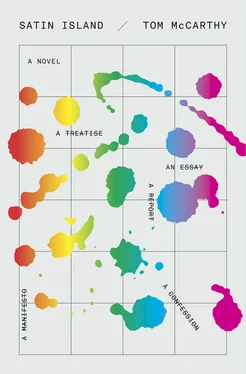10.5A swell would, every time, be building up inside the hall at this point in the lecture, nods and murmurs turning into exclamations of excitement; and I’d ride it into the next sentence, leaning forward on my podium. Thus, gentlemen, I’d say, the ocean’s choreography, which for so long has held such fascination for us, is made sharper, more momentous: it is amplified. With this word, amplified , the swell would break into a foaming, multi-voiced cry of huzzah! , surging down the banked rows towards me. Letting it wash past me, then holding its edge back again by raising my wi-fi-enabled finger, I’d continue: The same goes for all those animals you see— click —on stricken beaches: tar-drenched birds who float bewilderedly in blackened rock-pools, or— click —stare out stoically from atop tarry boulders. Robbed of flight, immobilized, humiliated in an almost ritual manner (and doesn’t the inversion make the custom even crueler? Feathers first, then pitch!), they become instant martyrs — and, in so becoming, are infused with all the pathos and nobility of tragic heroes. Living Pompeiians! Victims of the oil Gorgon! They, too, are improved — yes, gentlemen, improved: augmented, transformed into monumental versions of themselves, superior by the same token as statues are bigger, better versions of historic people. Even the rocks on which they perch are granted status and significance by having their forms so meticulously re-molded by the oil that duplicates them half a centimetre beyond their own mass’s natural boundary. Ask any sculptor: to recast even the dullest object is to celebrate it, to align it with its essence at the very moment this emerges, becomes manifest. Has oil not done this to these rocks? Of course it has, with a panache that’s the more brilliant for its simplicity: it has made them rockier.
10.6At this point in my speech a lone, indignant figure in the auditorium’s back row would pipe up: Shame, sir! Shame! The atmosphere would tense up: a dissenter! I would peer over my glasses, see the wheel-mounted carry-on bag standing at my critic’s side and immediately recognize him: it was my old neighbour from Turin — suit on, tie off — bemoaning in his best Eurozonese this spectacle of nature’s defilement; denouncing my aestheticizing of it. Me? I’d ask him, glancing exaggeratedly around and behind me for effect; I’m “aestheticizing” it? Gentlemen, I’d reason, opening my arms up to my serried ranks of allies; was it not he who first used the term tragedy ? Cheers, rising from hundreds of chests in unison, drowned out his protests: the exchange in the transit lounge was universal knowledge; they all knew that I was right. Who, I’d continue, cast the first aesthetic stone? The truth is, that these people’s (for behind this man there lay a much larger constituency: they’d be there, too, dotted about the streets around the conferencing centre, and in homes throughout the city, and in other cities, purchasing ecologically sourced products, sponsoring zoo animals and so forth) — these people’s entire mindset is a product of aesthetics. Bad aesthetics, at that: misguided and ignorant. They dislike the oil spill for the way it makes the coastline look “not right,” prevents it from illustrating the vision of nature that’s been handed down from theologians to romantic poets to explorers, tourists, television viewers: as sublime, virginal and pure. Kitsch, I tell you (here I’d thump my fist onto the podium, three times in quick succession): kitsch, kitsch, kitsch! And wrong: for what is oil but nature? Rock-filtered organic compounds — animal, vegetable and mineral — broken down and concentrated by the planet’s very crust: what could be purer than that? When oil splatters a coastline, Earth wells back up and reveals itself; nature’s hidden nature gushes forth. The man who brings this gushing-forth about — the drunk ship’s captain, oversightful engineer or negligent safety officer, or, behind these, the oil magnate, or, behind even him, the collective man whose body, faceless and compound as oil itself, is the corporation —he should be considered a true environmentalist: nature’s more honest intermediary, its loyaler servant. The cheers, at this point, grew quite deafening; the argument was won; and my foe would be evicted from the building, whimpering as blows rained down on him.
10.7The atmosphere inside the auditorium was, by now — each time — ecstatic. With the casting-out of this sad bleater, a new society, bound in brotherhood of truth and love of oil spills, had been founded. In anticipation of this moment, I’d cued up a second video-file that showed dead fish lolling around congealed oil on the sea’s floor. The slowness of this scene (it had been edited by Daniel for maximum effect) was lulling, soothing. Look, I’d say in a quiet voice after we’d all watched the footage, mesmerized, in silence for a while; look at these fishes’ eyes. They’re black and opaque. And rightly so: for aren’t eyes windows to the soul? If you cut open these fish — ichthyomancy, I believe, is the correct. In former times, the appellation for this would have been. Wolfskin-clad men who. If you cut open these fish, you would find oil inside their liver, kidneys, brain and heart. It’s what’s most intimate to them — what, of them, has survived. Look at the mild underwater current roll them slightly one way, then another. See how their bodies seem to merge with the black mass, then to emerge from it again: belly, gill or tail-edge first, producing strange, outlandish, not-quite-fish shapes. Does it not look as though they were regressing to some previous stage in the evolutionary cycle — not just their own, but that of the whole universe? To some interim state of mutation, one in which all forms are up for grabs? Dice in the air, the roulette ball still zipping round the wheel’s rim: anything is possible! God’s first act, we are told, was to conjoin and divide as he moved through the waters. This, then, is the primal deed replaying itself — but godlessly, driven and orchestrated by the whims of matter alone. It’s all the more sacred for that, gentlemen, because all the more true. Nature is senseless. And nature is dirty.
10.8My fifteen minutes? I’d say, noticing the organizer in the wings, hidden from the audience’s view but not from mine, fidgeting with his watch or walkie-talkie, the next scheduled speaker standing awkwardly beside him. What is a quarter-hour, or century, compared to this? Is not the flow of oil the flow of time itself: slowly but inevitably crawling, in a series of identical, repeating pulses, to some final shoreline? It embodies time, contains it: future, present, past. How many epochs (with this word I’d pause, as though distracted by the slight, fleeting intrusion of some parallel universe, before pawing the thought away) — how many epochs of pre-history are lodged in this Paleozoic ooze? What back-catalogues of Vendian biota, proto-Cnidarians and Ediacara, their amalgamated urolites and coprolites and burrows, their trace-fossils? To genuinely contemplate, gentlemen, even the smallest drop — to attend to it faithfully, exhaustively — would be to let time expand beyond its Ordovician and Precambrian borders, till it overflowed all measurable limits. When oil spills, Earth opens its archives. That it takes the form of vinyl when it hardens is no chance occurrence; what those men in body-suits on beaches should be doing is not brushing it away but lowering a needle to its furrows and replaying it all, and amplifying it all the while to boot: up and up, exponentially, until from littoral to plain to mountain, land to sky and back to sea again, the destiny of every trilobite resounds. Thank you. Thank you. I’d step back from the lectern and begin to leave the podium, but the cheering would be so clamorous that I’d be forced to come back time and again, to take another bow. Delegates would be surging forwards, address books open, business cards stretched out towards me, their numbers overwhelming the security personnel who tried to hold them back. Thank you, I’d say. Thank you. Thank you once again. I’ll see you in the sauna. Thus passed the week.
Читать дальше












